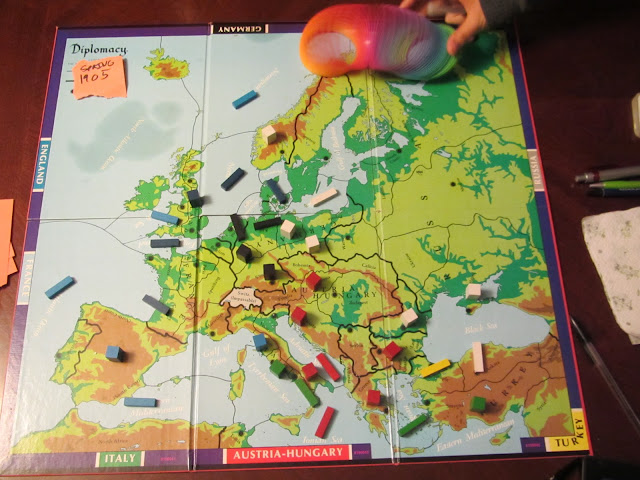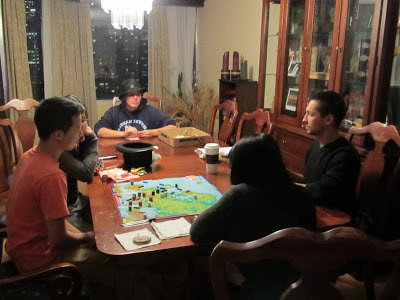de Oorlog tot de Beschaving
vol. 1 (1901)
The threat of war looms heavy across Europe's oft-ravaged bosom. Men, women, and children crowd into their basements and prepare for the sound of gunfire in the streets: it seems the prayers of civilians go unheard, for Europe appears to be headed not to a deescalation but rather towards increasing hostilities and even all-out war.
Two major conflicts are the focus of fighting in 1901, as power-hungry nations flex their military brawn. In the South, Austria-Hungary and Turkey send their divisions, en force, into the Balkans, keen to reap the spoils of that fertile land. Russia occupies Romania but stays out of the developing conflict.
In the North, France forces the English out of Belgium, while Germany and Russia bicker over Sweden. The English send their fleet into the icy waters of the Barents: a prelude to an attempted invasion of Mother Russia?
The Balance of Powers in 1901
While Europe totters on the edge of all-out war, no real blood has been spilled, and in number the powers are fairly well-matched. All the nations have increased their military strength to 5 units, with the exceptions of Turkey, England, and Italy. This is not unexpected, as those three nations have the best defensive positions, and tend to find their expansion more slowly than the others. However, the numbers do not tell the full story: the balance of power has already shifted much more significantly than that. A few seemingly minor decisions taken in 1901 will carry irrevocable consequences for the years to come.
Germany chose a standard opening, taking Denmark and Holland, and stayed out of the conflict developing over Belgium (effectively giving Belgium to the French). The Kaiser also chose to pick a fight with the Russians, attempting to invade Sweden at the same time as the Russian forces. (This is not usually an event which leaves Germany in a good position, but only time will tell whether these two can patch up their diplomatic relations.) More significantly, however, a mishap took place among the German leadership, with orders from on high sent to Kiel for the production of a fleet of destroyers. The German workers, embroiled in conflict with the infantry divisions already occupying Shleswig-Holstein, refused to carry out these orders.
The result is that no army was built in Munich this year, leaving it unoccupied. This mishap will have huge repercussions for both France and Austria, as we will see.
Nevertheless, chances are good that by the end of the year Germany will be expanding her military forces by at least one unit. But at the moment, the Kaiser cannot help feeling a little exposed: a nation attempting to hold five Centres with four units is extremely vulnerable. Careful diplomacy will be Germany's only defense until the Kaiser can manage to address this vulnerability, as such weaknesses are rarely left unexploited in Diplomacy, particularly for a central power like Germany, surrounded by wolves on all sides.
Italy had an uneventful first year, convoying to Tunis and playing a safe defensive opening: not a bad start for the Italians. However, it is not clear where Italy's next build will come from: the King will need to pick his next target and strike soon or be left behind in the dust as the other nations grow (a fate Italy often suffers, and, indeed, fell into during the last two Great Wars).
Italy's diplomatic position, however, appears to be superlative: during 1901 the King was able to convince France to leave Marseilles undefended (he could have claimed it for Italy last Fall) and Austria-Hungary to leave Trieste ungarrisoned. Not bad for a first year: Italy managed to convince both Austria and France to expose their bellies to him, and although he did not take advantage of either opening just yet, this suggests good things are in Italy's future.
Russia had a fairly unfortunate opening (it is not atypical for Russia to end 1901 with six units and still be the first country eliminated), with enemies in the North contesting her grasp over Sweden and a solid wall of forces in the South. Germany's attempt to invade Sweden in 1901 has historically always been a near-crippling blow for the Russians, and the powerful Austrian presence in the South-West is also bad news. This kind of opening tends to be fairly deadly for Russia, so defensive play will need to be the Czarina's approach in the next few years: she will need some solid allies in the year or two to come. England's opening was outright hostile and Austria appears to be pondering a Russian assault, so she will need to keep her eyes on both nations.
Still, her fortunes could reverse with patience and clever tactical play. Such a poor opening is no death sentence: just a cause for some serious concern. The lack of conflict over the Black Sea suggests that Russia's relations with Turkey are peaceful, which bodes well for her future.
Austria-Hungary's fortunes, on the other hand, are on the rise. This nation, which usually is either eliminated in the first few years or goes straight to the top appears to be on the rise. A successful invasion of Serbia and Greece gives Austria a good depth of defensive power and military strength: an Austria that can manage to grow to about 6 units tends to dominate in the Eastern half of the board in the early game. The big fear for Austria is always one of being crushed from all sides. However, Russia and Italy both appear to be friendly, and Germany has failed to maintain a garrison in Munich, which means Austria is sitting pretty, and, by our estimate, the second most successful nation in 1901. Her only vulnerability at present is her complete lack of defenses against Italy. Will that prove to be her undoing? Ideally, she would be able to build a second fleet with her next build and occupy the Adriatic: from there on, Austria moves beyond her early-game weakness and tends to become a powerhouse.
Her aggressive builds (army Vienna and army Budapest) suggest that she is either planning to invade Russia (not currently a realistic prospect, due to the concentration of forces in the area) or is going to great lengths to keep Italy happy (which could prove very costly to her when Italy starts getting hungry for another build). Nevertheless, between the lack of an army in Munich, Russia's safe position well away from her borders, and her dominance over the Turks in the Balkans means that the Empress has had an unusually easy and profitable first year. Austria-Hungary's future looks bright.
Turkey's early progress has been stalled by aggressive Austrian moves. This is not an unusual situation for the Sultan to find himself in during 1901, but he will have to exercise patience and move slowly, waiting for the right moment to throw his force West. His position in the early game is both extremely secure and at the same time unlikely to grow anytime soon. Turkey benefits most from an Austria-Italy conflict early in the game, so his diplomatic options are fairly clear: will he offer Greece to Italy? When Austria pushes her way East with such determination, this situation tends to end with a massive Italian invasion of the Austro-Hungarian empire. The Sultan in this position usually finds that supporting or encouraging Italy against Austria is his most natural and productive course of action.
England plays an extremely aggressive opening against Russia, aiming for Norway and St. Petersburg and building a third fleet in Edinburgh. Unfortunately, things do not go well for England in 1901. First, France forces the English landing party out of Belgium. This may prove to be a significant drawback to the English: of the four Centres available to England in the first two turns (Norway, Denmark, Holland, and Belgium), only one proved accessible. England may now find it impossible to find a foothold on the mainland. If so, this will be a painful blow to the Queen, as a lack of continental presence tends to reduce the British Empire to a minor player and then an early elimination, as we saw in last year's game.
That alone would be bad news, but things get even worse. First of all, her attempt to strike at St. Petersburg was likely to succeed... until Russia built an army in St. Petersburg. Her progress in the North will be slow and painful from now on, if she wishes to push her luck further. Much more importantly, however, big things are afoot in the South. The two most vital territories for England are the English Channel and the North Sea. It is not a stretch to say that England's fortunes in Diplomacy can be predicted by how well she can control these two sea territories. If England loses either one to another nation, her fate is usually quickly sealed. (This dynamic can be quite easily seen in last year's game, for the historically-minded: France took the North Atlantic in 1903, the Channel in 1904, and from that point on England's fortunes never recovered, leading to her eventual elimination in St. Petersburg.)
This is where things begin to look grim: England's choice of a Northern fleet build always means danger in the South. However, France's builds in the first year were all fleets -- the worst possible news for an English monarch. Why? Let's consider what French fleet builds in Brest can possibly mean for Anglo-French relations:
What can France do with three fleets? An attack on Italy is possible, but unlikely: fleets in the Brest-Picardy area would take almost three years to maneuver into position for an attack on Italy. That is not an effective plan. An attack on Germany will use, at most, one fleet, so that is not a terribly likely explanation -- what are the other two for?
The remaining option is a devastating attack on England, and the ground for such an offensive has already been surrendered: with all the British navy in Northern waters, France has already won the battle over the English Channel and could be convoying troops into London within two moves. France has no possible disincentive for taking advantage of these truly unusual circumstances: though no shots have been fired yet, France has already nearly won her war against England.
This is why England's next few years will be nail-biting ones: her future hangs by a thread, and the French President is the one holding the scissors.
This brings our account to France's position. There can be no question that France's position at the end of 1901 is the strongest on the board. France has five units, of which four are in position to make effective moves and not tied down for defense. In addition, France has pulled a neat trick (the same device France used last year): taking Belgium and Spain in 1901 leaves the President one more build (from Portugal) for 1902. Therefore we can safely say that France will end 1902 with at least six units (something no other nation can claim). (The only possible loss France faces this year is Belgium, but France can easily defend Belgium with her two fleets, especially if she positions one in the English Channel.) This means that England and Germany have allowed France a leg up on both of them, and an extremely strong position to boot.
France's position is made even more secure by Germany's mistake: the German army in Munich is normally one of the few checks and balances for France's growth. Under normal circumstances, such a heavy fleet balance would leave France hopelessly exposed to German armies. However, without a build in Munich, France truly has nothing to worry about. We are likely to see France (who is, statistically, the most likely country to win in Diplomacy anyway) repeat last year's rampage, starting with a decisive victory over England.
And so, that leaves us with the state of Europe as we approach 1902:
Fairly typical openings for Italy and Turkey, a troublesome start for Russia and Germany (who usually end 1901 with six and five units, respectively), and a very successful first year for a quickly-growing Austria. Meanwhile, England suffers effective disaster, with only one build and complete exposure to France's brimming fleets. France comes out on top, with six Centres under the President's control, no threats, and his knife poised just above England's completely exposed kidneys.
Exposure to an enemy in Diplomacy does not always mean immediate death (although long-term exposure is always lethal sooner or later, as France and Russia learned in our last two Great Wars), but in this case there is no possible incentive for England not to take advantage of this opportunity: the fleet builds show that the President has already committed to this course of action.
1902 will be an interesting year.
























